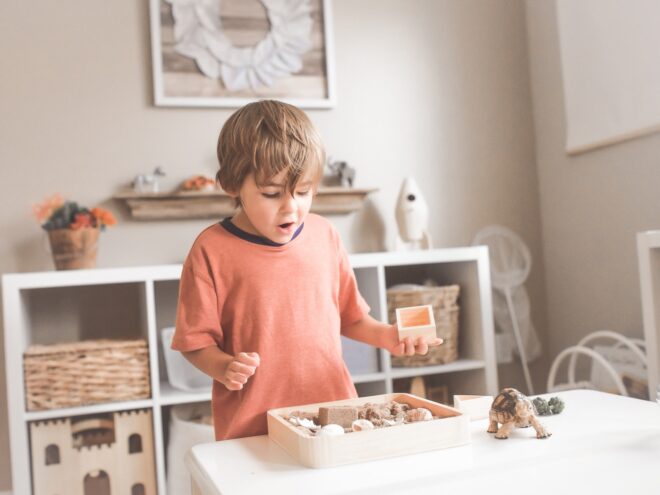Family • 08/18/2018
Do Bananas Help You Poop? And Other Digestive Problems

Revivalist is a reader-supported endeavor and our posts may contain affiliate links. When you buy through links on our site, we may earn an affiliate commission.
Do bananas help you poop? Well — two types of fiber typically make up food — soluble and insoluble. Soluble fiber, such as that found in oatmeal, dissolves in water and soaks up moisture. On the other hand, insoluble fiber can’t break down, like much of the fiber in carrots.
Your gut can pass pretty interesting objects, as your childhood likely evidenced, but stomach acid can’t deconstruct fiber. Your gut health benefits from producing metabolites, but fiber just passes through.
Many people stay away from bananas because they think the fruit makes them poop more, but do they? Bananas contain both soluble and insoluble fiber, but food labels only list “dietary fiber” as the combined total of the two. Most of a banana’s fiber is insoluble, which means it does make up the bulk of your poop. It also makes a rush-hour circuit through your intestines to get to the other side.
Bananas make you poop more if you have a sensitivity to them or eat more than you should. Your body will adjust, and you get a staycation on the toilet — especially if you’re backed up.
Banana Ripeness and Digestive Health
There’s an art to picking the perfect banana to promote digestive health. Green bananas are a great choice if you’re looking for something lower on the glycemic index or you’re concerned about your blood sugar, but they’re not good for digestive health.
As bananas start to ripen, all that resistant starch starts to turn to sugar. They lose some of their micronutrients during this transition but begin to develop more antioxidants. Once they start earning their spots, bananas contain more antioxidants than micronutrients. They’re so good for you that they’ve even been shown to help prevent cancer.
Beyond that, the only things your super-ripe bananas are good for are smoothies and banana bread. You can take advantage of those antioxidants by including them in pancakes and muffins, too.
When choosing bananas, always go for yellow over green, since the ripeness factor influences the onset of side effects in your bowel. Green bananas hold a third “fiber” called resistant starch which is anti-digestion, but your gut flora eventually eliminate it. Resistant starch acts similarly to fiber and increases the bulk of your poo and how fast it processes through your digestive system.
So, the less ripe bananas are, the more likely they will cause digestive issues.
Foods to Avoid for Digestive Health
Adding bananas to your diet won’t make you poop if you’re filling your diet with foods that promote constipation and negatively affect your gut health. Too much caffeine, for example, can cause illness — especially if you’re already dehydrated. White rice doesn’t have any of the natural fiber of brown rice, which can make it harder to poop. If you love rice, switch to brown because it still contains the husk, bran and germ that are good for your health.
We all enjoy a good steak now and then, but if you’re having digestive problems, it can be a good idea to avoid red meat. It’s higher in fat than lean proteins, which means its trip through your intestines is slow. It can also be difficult to digest due to tough protein fibers and high iron content.
White bread and other processed flour products present the same problem as white rice. Virtually all the fiber has been removed in the bleaching process necessary to make the bread white, so it won’t help your digestive issues and can make them worse.
Alcohol dehydrates you, which exacerbates constipation symptoms, and it can also be irritating for your digestive tract. You can mitigate this problem by alternating alcoholic beverages with water or sports drinks, but if you’re experiencing digestive issues, it might be a good idea to lay off the booze for a while.
Even chocolate, which is high in fat and calories, can make your digestive problems worse. We know, it’s tragic.
Choose Your Digestive Path
Remember those choose-your-own-adventure books? Here’s a new one to choosing your digestive path. It’s called “Defecation or Constipation? You Decide.”
Just because bananas contain a high degree of insoluble fiber doesn’t mean they can’t help regulate your system. Do you regularly take a laxative to do a number two?
Why not turn to whole foods to save money and do the job instead? One banana holds a degree of soluble fiber similar to a tablespoon of Metamucil, and Metamucil also contains psyllium husk as its active ingredient, which comes from the plantago ovata plant — yup, it’s in the banana plant family. Psyllium soaks up water to create more bulk and promote regular bowel movements without flatulence.
Wait for it. Let it sink in. Aha — yes, you can use bananas to help regulate your digestion. When you take Metamucil, the instructions say to dissolve the pill in a glass of water. You get constipation if you don’t get enough water in and eat too much soluble fiber.
Compare it to oatmeal, which is soluble, as you remember. Dense poo backs you up and slows your plumbing, but bananas bulk up your stool by absorbing water, therefore making it easier to poop. Bananas are a part of the BRAT diet to calm diarrhea, which stands for “banana, rice, applesauce, toast” — so, be a brat and nosh on a banana loaded with fiber and potassium.
Bananas can cause constipation, but if you ingest healthy degrees of fiber moderately, you’ll poop more regularly. If you eat too many bananas, you’ll poop more than usual if you drink a bunch of water with it — producing loose stools. If you eat too many bananas without water, you get backed up.
Choose your digestive path, and your fluid intake will determine your compass direction. So, toss a banana into your morning smoothie for a good fiber-to-liquid ratio, but don’t give into your inner ape and destroy the bananas you just bought at the grocery store in one sitting.
Remember other fruits have similar degrees of soluble and insoluble fiber. An unpeeled apple holds more insoluble fiber at 70 percent in the peel, with 30 percent of soluble fiber in the flesh. Eating the peel helps regulate your digestive system. Low-cellulose fruits, like watermelon and cantaloupe, will have different levels.
Bananas and apples aren’t the only healthy snacks that can help you poop better. Prunes, for example, are rich in a natural sugar alcohol called sorbitol that draws water into the intestines, stimulating healthy bowel movements. This is even more effective than typical psyllium fiber supplements like Metamucil.
Kiwi contains 2.3 grams of fiber. Beans contain both soluble and insoluble fiber, and that insoluble fiber is what you need to add bulk to your stools and reduce constipation. A 2016 study found that a balanced diet of both types of fiber can prevent illness, as well as reduce both bloating and gas problems.
Watch out for unripe bananas, and yes, eating bananas will bulk up your poo due to insoluble fiber. You may want to trust more in bananas if you have problems with irregular bowel movements. Use water as your pooping compass.
When you eat a bowl of banana pudding for dessert, make sure you have enough pudding, and drink a glass of water afterward.
Subscribe to Our Weekly Newsletter
We would love to connect deeper with you!


